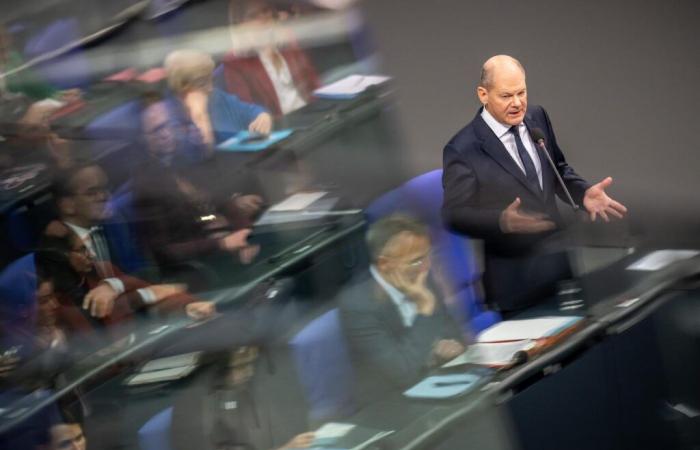On both sides of the Rhine, there is a political crisis… Such simultaneity is rare between the two neighbors. In France, the Barnier government was on the verge of falling this Wednesday, December 4. In Germany, Olaf Scholz is also in difficulty. Since November 6 and the dismissal of his liberal allies, he no longer has a parliamentary majority. The chancellor will ask the question of confidence in the Bundestag on December 16, with the aim of paving the way for early elections, scheduled for February 23, 2025. As in France, it is the budgetary questions which got the better of the tripartite coalition , between social democrats, liberals and ecologists.
The parallel between Paris and Berlin ends there. “Compared to France, the current German political crisis is minor, explains Marc Ringel, director of the Franco-German center in Ludwigsburg (DFI). Post-war Germany built its new institutions by taking the opposite approach to the Weimar Republic. The procedures are sometimes cumbersome, but they provide stability. » Across the Rhine, in fact, only the chancellor can provoke a dissolution of the Bundestag by asking a question of confidence, then by being put in the minority. The scenario that is currently unfolding.
On the other hand, French-style motions of censure do not exist. If the opposition wants to bring down the government, it must first agree on a new chancellor and form an alternative majority. An option that only came to fruition once, in 1982.
Elections to regain stability
Unlike what is happening in France, the current political crisis in Germany therefore bodes well for clarification. “The coalition broke up, but now we are entering a normal situation, with early elections and the establishment of a preparatory budget. It is a process provided for by the Constitution,” explains Marc Ringel. “The various political parties wish to agree to find a majority in the future assembly. Creating coalitions is part of the German political system. This contrasts with French political culture,” he analyzes.
The German press shares the same observation on the current blockage in France: “If the government (by Michel Barnier) falls, the situation in the National Assembly will remain as it is. The presidential party does not have a majority, it is stuck between the left and right blocs,” explained this Wednesday the conservative daily Frankfurter Allgemeine Zeitung (HE DOES).
In Germany, the current absence of a majority in the Bundestag is delaying decisions on defense and economic recovery. But the fear of lasting instability is minimal. Favorite for the upcoming legislative elections, the Christian Democratic right (CDU) is already discussing scenarios for after February 23. Will we see the return of a “Groko”, in other words a grand coalition with the social democrats? The CDU also leaves the door open for environmentalists to participate in a future government. Among the population, the relief is perceptible. The fall of Olaf Scholz’s tripartite coalition effectively puts an end to a period of cacophony.
France, “new Greece”?
Conversely, seen from Germany, we fear that France will settle into a lasting political crisis, without a stable government, without a budget, and with borrowing rates higher than those of Greece. “Is France the new Greece? “, wonders Spiegel which describes a “Heavily indebted French state, led by a dysfunctional political apparatus and incapable of managing public finances”.
“This toxic mix of high debt, populist politics and rising interest rates is putting Europe in trouble,” deplores the magazine, which fears “a possible new euro crisis”. Such a prospect appears like a nightmare for a Germany which is struggling to get back on the path to growth.






